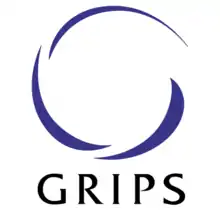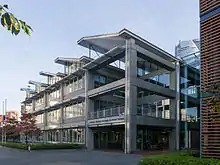National Graduate Institute for Policy Studies
The National Graduate Institute for Policy Studies (政策研究大学院大学, Seisaku Kenkyū Daigakuin Daigaku), or GRIPS, is an elite and highly selective research graduate school located in Minato, Tokyo. Funded by the Japanese Government, it has the status of national university. It is also one of Asia's leading think tanks of policy scholars and social scientists focused on policy studies. It offers programs in security and international affairs, diplomacy, international development studies, economics, political science, disaster studies, and science and technology policies, among others.


Overview
Founded in 1997 as a stand-alone graduate institute, GRIPS is composed of world-class academics and distinguished practitioners with expertise in public sector policy formulation and management. Around 20% of the faculty and 70% of students are recruited from outside Japan.
Locally known as the National Graduate Institute for Policy Studies, GRIPS is a stand-alone graduate school with an attached research center and a global reach. In August 2020, IDEAS ranked GRIPS to be the second highest-ranking Economics and Finance institute in Japan, after the University of Tokyo.[1] IDEAS also ranked GRIPS the 12th (from 14th in 2018) highest-ranking Economics and Finance research institution in Asia during the same time period based on research output and citations.[2]
Academic programs
Located in central Tokyo, the institute offers graduate programs at both the Master's and Ph.D. levels:
- Master’s Programs (International Programs)
- Young Leaders Program (School of Government)
- Young Leaders Program (School of Local Governance)
- One-year Master’s Program of Public Policy (MP1)
- Two-year Master’s Program of Public Policy (MP2)
- Macroeconomic Policy
- Public Finance
- Disaster Management Policy
- Economics, Planning and Public Policy
- Graduate Program in Japanese Language and Culture
- Master’s Programs (Domestic Programs)
- Public Policy
- Development Policy
- Cultural Policy
- Intellectual Property
- Urban Policy
- Education Policy
- Disaster Risk Management
- Science, Technology and Innovation Policy
- Ph.D. Program (5-Year Doctoral Program)
- Policy Analysis Program
- Ph.D./ Doctoral Programs (3-Year Doctoral Programs)
- Public Policy (Doctor of Public Policy)
- Security and International Studies (PhD/Doctor of International Relations)
- Disaster Management
- Science, Technology and Innovation Policy
- State Building and Economic Development
- Japanese Language and Culture
Notable Academics
Fumio Hayashi: Professor of Economics
Hiroko Ōta: Professor of Economics. Former Japanese cabinet minister of economic policy.
Takatoshi Ito: Professor of Economics
Akihiko Tanaka: President. Former President of Japan International Cooperation Agency
References
- "Top 25% Institutions and Economists in Japan, as of August 2020". IDEAS. Federal Reserve Bank of St. Louis. August 2020. Retrieved 16 September 2020.
- "Top 12.5% Asia, as of August 2020". IDEAS. Federal Reserve Bank of St. Louis. August 2020. Retrieved 16 September 2020.
External links
| Wikimedia Commons has media related to National Graduate Institute for Policy Studies. |